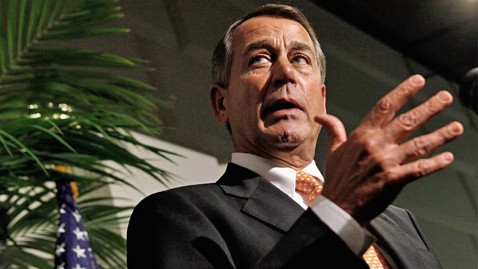Payroll Tax Showdown: What It Means to You

Chip Somodevilla/Getty Images
After a bipartisan bill to extend the payroll tax cut for two months passed the Senate on Saturday and was expected to fail in the House today, lawmakers in Washington could hang their hats for the holidays tonight without extending the 2 percent tax cut.
If Congress does not act before Jan. 1, the average American would get a New Years gift in the form of a $1,000 tax hike.
Both parties have already agreed that the tax break should be extended, but a political fight revolves around how to pay for the $112 billion tax cut, which went unfunded last year and which both parties have vowed will not add to the deficit this time around.
If the temporary holiday is allowed to expire, as it is set to do on Jan. 1, 160 million workers would see their payroll taxes, which fund Social Security , jump back to 6.2 percent, meaning Uncle Sam would take an extra $1,000 from a worker who earns $50,000 in 2012.
"If it doesn't happen, every paycheck in the country will go down on Jan. 1," said Chuck Marr, the director of federal tax policy at the Center for Budget and Policy Priorities. "It's real money. Every person you see every day has a thousand dollars less money. That's a lot of bucks."
Because payroll taxes are only collected on the first $106,800 of income, cutting the rate has the greatest impact on low and middle income earners, groups that tend to spend the largest proportion of their income.
"With the payroll tax cut, what is really at stake here is deciding whether or not to infuse $120 billion of disposable income into the economy in 2012," said Andrew Fieldhouse, a federal budget policy analyst at the Economic Policy Institute. "It's not the best way to create jobs, but it is the biggest jobs measure being considered by Congress."
Both Republicans and Democrats agree that raising taxes on middle and low income earners is a bad idea in the midst of a fragile economic recovery. But the jury is still out on how big of an effect extending the current tax break will have on stimulating growth.
Republicans argue that the price tag is not worth the minimal stimulus effect, but Democrats claim it is necessary to keep the economy growing.
Curtis Dubay, senior tax policy analyst at the conservative Heritage Foundation, said extending the cut will have a "minimal if any impact on the economy."
"Giving [the middle class] more money to spend for one year does not impact at all the type of productive activities that promote economic growth like saving and investing," Dubay said.
The Congressional Budget Office estimated that for every tax dollar the federal government loses through the tax cut, about 30 cents to 90 cents will be added to GDP.
If Congress fails to extend the payroll tax cut, which has been in place since December 2010, Fieldhouse said economic growth would "filter out to a rate that is grossly inadequate" to rebuild the economy.
"Not a single economist out there says this has a negligible impact," Fieldhouse said. "It's real disposable income for working families and overall a lot of economic activity."
But with 12 days remaining before the current cut expires and with Congress still entrenched in a face-off over how to fund an extension, the threat that there will be a lapse in the payroll tax cut looms as the clock ticks down to New Years.